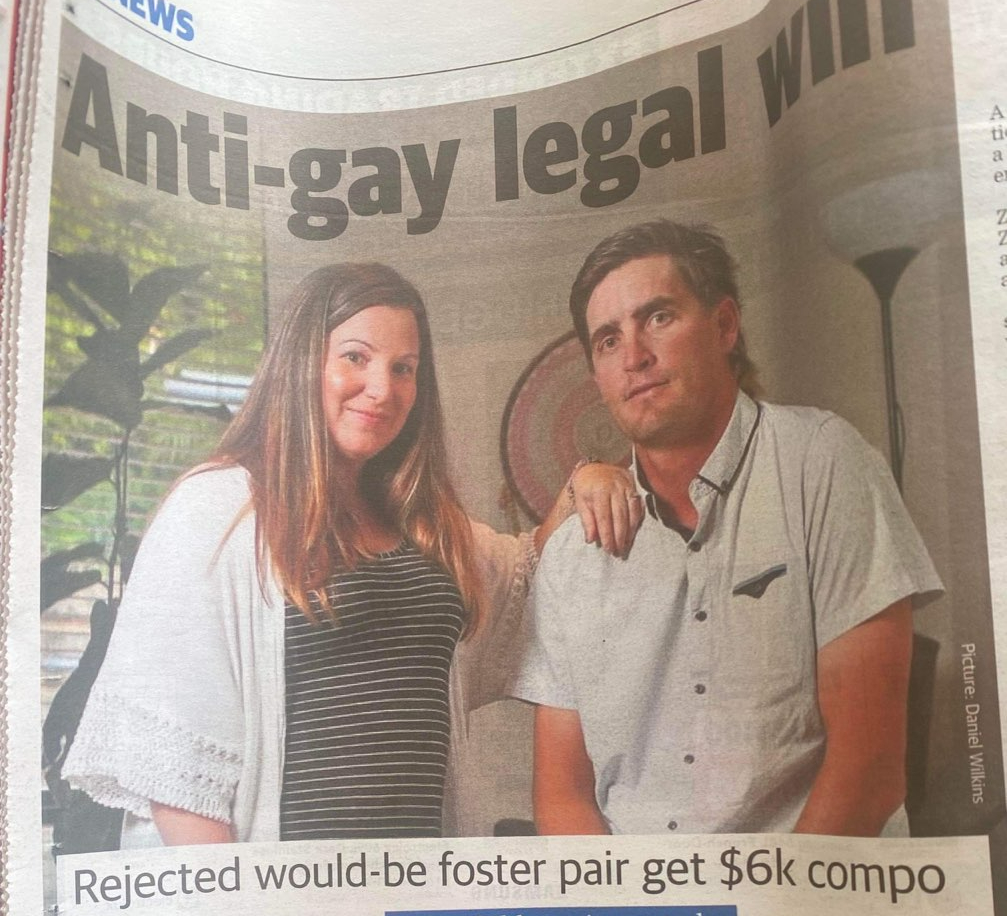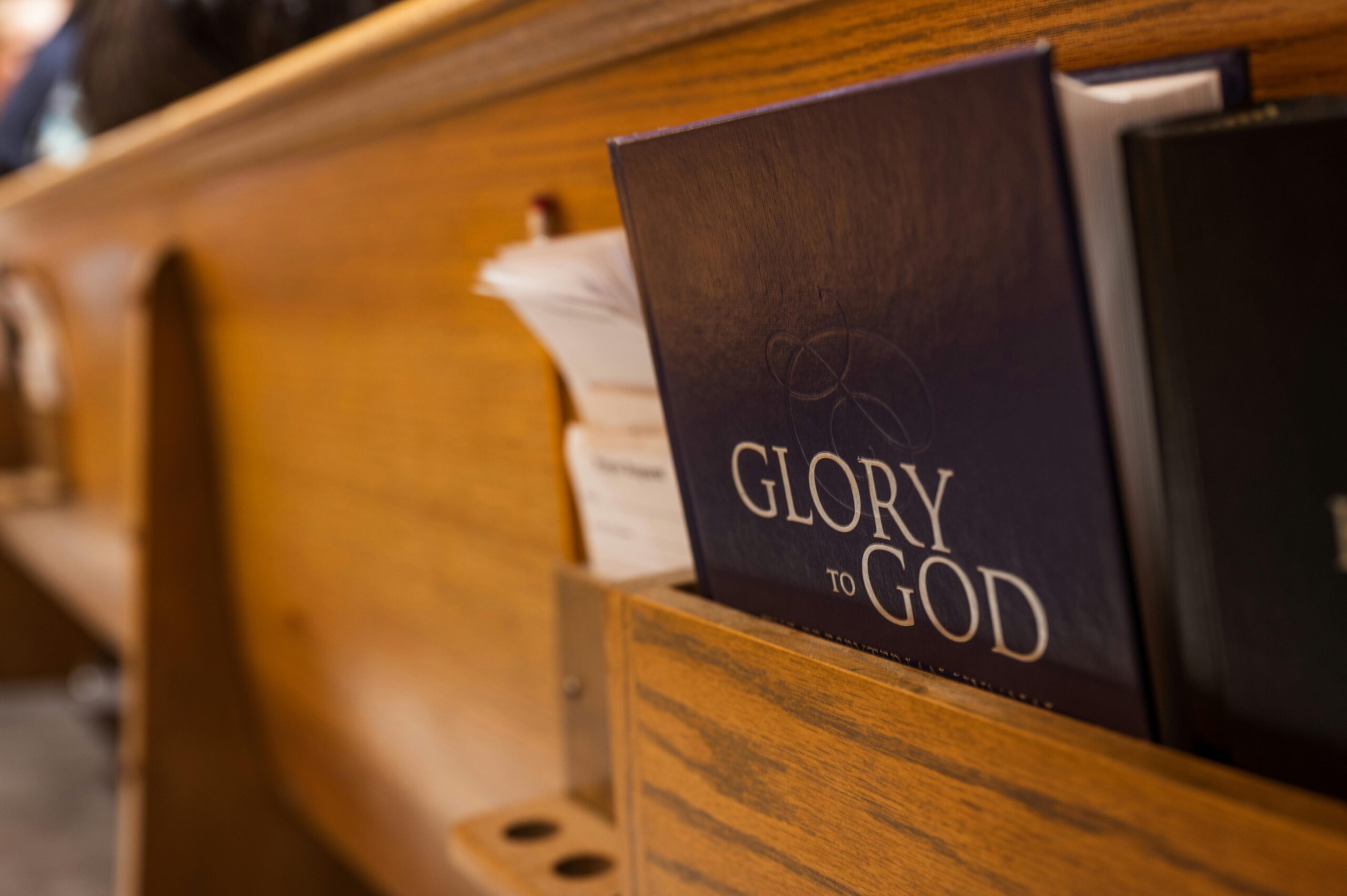December 26, 2022
Christian Foster Parents, Gay Children and Six Thousand Dollars Worth of Hurt Feelings

Nearly three years ago, right before the pandemic locked down my home state and there were more important things to worry about, I wrote about the case of a Western Australian couple who had been rejected as short term foster carers by a government funded adoption agency.
You can read that article here.
The case of Bryon and Keira Hordyk hit the news headlines before everything went haywire. But now that the pandemic dust has settled (for now!), the case is in the news again because a settlement has been reached. As reported in The West Australian newspaper today, the Hordyks have received a settlement of six thousand dollars for “hurt feelings”.
Or as the headline in the newspaper states (and it is an editorial board that has a particular hostility towards the Christian view on sexuality, “Anti-Gay Legal Win”.
As a Christian couple who hold to an orthodox view on Christian sexuality, they Hordyks were refused to be part of a foster system. Why? Because they explicitly stated, when asked the question by Wanslea Family Services, that they believed that all sexual relationships outside of marriage broke the seventh commandment: “You shall not commit adultery.” Given their views of marriage, that puts all sexual relationships outside of heterosexual marriage outside of God’s boundaries. No surprises there.
But that was clearly a red flag for Wanslea who pursued the matter further, by asking questions around same sex attraction and same sex relationships, specifically in relation to minors in their care. That’s when things came apart for the Hordyks. A series of case studies was put to them, including a scenario in which a minor in their care was seen kissing another student of the same sex at school. The West Australian reports the fairly normal orthodox Christian response that the Hordyks gave: “That they would tell the child they were loved but that the behaviour was sinful and needed to resisted.”
Well, a fairly normal orthodox Christian response if the child were their own child. And this is where I think it gets complicated. For as I reported back in February 2020, the complexity around this matter is this:
The foster system puts children into short term care with foster parents who they believe will most help the child align with their current values framework.
Incidentally, that’s why in Australia there is often a complexity in how – or even if – indigenous children can be placed with non-indigenous placements. There’s a whole colonial history of mistakes in there that are still playing out. In my previous article I wrote this:
As a friend told me, (who is a foster parent and who hold similar views on sexuality as the Hordyks, and who was also quizzed about this), there is a marked difference between caring for someone else’s child and caring for your own. If a child was Buddhist in your care it would be a good idea to allow them to attend temple if they so desired. It’s a very fine line to walk.
You can see where this is going. And these complexities will never go away.
And here’s another caveat to all of this: a church I was involved with has become a good support to Wanslea and does practical work for the organisation. The church likes what Wanslea does and want to support local issues that directly affect the part of town the church is in. One key pressure is the lack of good foster care and agency support. That’s been a significant partnership over the years between the church and Wanslea.
But let’s stick with the recent ruling, and not revisit old ground. Here are some observations from the story, and the manner in which the story is being reported in The West Australian (and beyond), and about the manner in which the Hordyks have approached this, both back then and now.
- Christianity’s perspective on sexuality and humanity are now viewed as weird. It’s interesting how the newspaper reports the views held by the Hordyks. The paper states this:
In addition to its beliefs that acting on homosexuality and transgenderism is a form of adultery, the Free Reformed Church also teaches that God created man and subsequently created woman to be a helper and companion for him.
Well, blow me down with a feather! Fancy that! Whoever heard of such a thing? That somehow God created humans and did so in that manner and with those reasons embedded in it all! Where do people like the Hordyks come up with such ideas? Indeed where did the Free Reformed Church find this stuff?
See the issue? That’s a stock standard orthodox Christian belief. Has been for thousands of years. But we now live in a setting in which the cultural engine is simply ticking over on the vapours of a faith that shaped its whole world and worldview. The cultural imaginary is no longer shaped by the Christian frame, much less recognises it as a valid and one-universally accepted one, even if not adhered to.
This tells us we have some work to do. That The West Australian has to explain this to people as if it were a rare and arcane fact believed by a small minority of people in a church most have never heard of is simply an admission that Christian beliefs are arcane and weird.
2. Christianity’s views on sexuality and humanity are now viewed as dangerous – at least when expressed publicly. The newspaper reports that the tribunal case was pursued by the Hordyks on the basis of Wanslea’s rejection of them due to them being unable to provide a safe physical and emotional space for a foster child who identified as LGBTIQ+. And, remember, the newspaper headlined this article “Anti-Gay Legal Win.”
However else the story comes out, there’s not much nuance in that headline or any other reporting of the matter. To hold to the orthodox view on such matters is seen a cut and dried manner. The days are long gone of “loving the sinner and hating the sin”, or even “everyone is broken”. When it comes to sexual expression it’s affirmation all the way down.
This of course raises all sorts of questions around the sexualisation of minors. We’re talking foster care, right? And we’re talking about sexual identity markers in minors, markers that the state is now affirming and allowing to be pinned on almost any age cohort. We’re even in a situation in the UK in which a government-approved group – Stonewall – has tweeted about how we must celebrate and care for our “trans toddlers”. If that is not simply the next step in sexualising young children in order to blur consent lines (at the very time we’re trying to tie down consent as a thing in and of itself), I don’t know what is.
Yet even in the face of the two points mentioned so far, I think this far from a cut and dried case of Christians getting the rough end of the deal.
3. The Hordyks were honest but not wise. Okay, so I’ll get some flak from the new breed of evangelical chest-beaters who think that any critique of a Christian approach in the public square is some sort of apostasy (hello neo-Christian nationalists on the east coast of Australia), but the Hordyks could have played their cards closer to their chest for the greater common good.
Why do I say that? Because I know other foster families who do exactly that. I know foster families who hold to the same theological position as the Hordyks, yet who act far more wisely in the setting and yet get roughly the same desired outcome. Families who have been exceptional foster parents for a variety of agencies and who have had the opportunity over a long period of time to guide and form the lives of children in a safe, enjoyable and happy setting.
I get that the Hosdyks believe what they believe, cos I believe it too. But if I were to foster a child at any stage, I’ll be under no illusions that the state or a state-funded organisation, views my Christian perspective on sexuality as anything but problematic. If you’re starting with a handicap, and you really want to foster children in this current setting, then perhaps you need to ask why the problem is only with the agency.
When the Hordyks said that they would raise foster children with the same values as their own children, that’s a problem. They’re not their own children, they are wards of the state. Great care must be taken in that setting.
On top of that, I’m not sure that the first, and reflexive, response to a child who exhibits same-sex attraction and follows through with that with a fabled kiss in the school yard, is to tell them it’s sinful. This is a foster child, right? This is a child who may have been controlled in unsafe ways by the adults in their lives through the use of coercive language. Do I believe that such behaviour is sinful in that it breaks God’s law around sexuality? Yes. Do I believe that’s the first thing to tell such a child in such a situation? I do not.
Perhaps the Hordyks would not have done that. However they explicitly said that is what they would do. Of course that does not change the manner in which they would love that child – and indeed I firmly believe that they would have said those words to the child out of their loving concern for them -, but nonetheless as a reflexive first time response, this is not helpful.
And while I do think that the secular culture has lost its moral compass and now views Christianity with deep suspicion, I don’t have any expectations that it will value what we believe around sexuality. Indeed, it’s because the secular culture has lost its moral compass that I don’t have any expectations that it will value what we will value what we believe around sexuality. And this raises the question: Should Christians bother with the foster system?
That depends on what you think your role in the system is supposed to be. Can we still be a common good – a sort of Venn diagram position – in which our desire for children to flourish has enough intersecting points with the culture? Enough that is to allow us to be involved in a post-Christian fostering system, while admitting that our societal ideals – a god-fearing public in which orthodox views on sexuality are celebrated as the preferred direction for everyone – will not be welcomed, much less promoted as a viable alternative?
Going into the increasingly secular future, with the percentage of people dropping who either holding to Christian values, or even recognise what Christianity is, God’s people have to decide what their engagement with the secular public square will be. I don’t think we’ve had a serious enough conversation about that in our churches.
4. I don’t think we should sue organisations for “hurt feelings”. There’s a pragmatic reason for this, and a principled reason. First, on the issue of pragmatics: if Christians go around seeking compensation for hurt feelings over what is said about their beliefs, then they can hardly express surprise when they same “hurt feelings” accusation is thrown back at them when they make claims about the values of others.
Now Wanslea did cast aspersions at the Hordyks and I get the concern the couple had. The agency asserted – according to The West Australian report that the Hordyks:
“…had shown a level of rigidity on gender and sexuality, which it argued was not based on their religious conviction.”
Quite frankly, that’s bad faith on Wanslea’s part. And it’s a bad faith that the tribunal called out when it determined against the agency, refuting the accusation of bad faith. There is enough nuance in what they Hordyks claimed about their faith, and their ability – in their minds – to manage the tension of loving someone whose actions they did not agree with, to strike that down.
And for Wanslea to think that such a conviction around sexuality is not based on religious conviction is either incredibly naive, or incredibly disingenuous. It’s as if those in the agency – or at least representing them – were as clueless as the average reader of The West Australian (and sadly, the writer of the article), in actually knowing what orthodox Christianity has believed for two thousand years. This makes it clear that whatever legal push-back Christians are getting from the state, there is a whole lot of law still on our side. The tribunal agreed that their had been loss and damage to the Hordyks reputation in awarding the case against Wanslea, “for hurt feelings and humiliation”.
But I don’t think we should be fighting “hurt feelings” fire with “hurt feelings” fire. In fact the Scriptures tell us to expect the world to be hostile towards what we believe. Indeed to rejoice in it. That’s the norm, or it has been, When Byron Hordyk makes this statement:
“It feels unfair to me to have to throw away my beliefs on these issues, just so I can be acceptable to Wanslea.
it raises two issues. First, he wasn’t asked to throw his beliefs away. The primary issue was around how he would care for a ward of the state, not his own child. The concern was around how he expressed those beliefs in a specific situation. Now we can argue that there’s not such thing as merely privatised beliefs. But as I’ve said, other foster families with the same beliefs have navigated this differently.
And secondly, what did he expect? We are, surely, long past the situation in which we expect secular organisations to tip their hat to values that most of their workers would view as abhorrent. I am just as surprised that he is surprised. As surprised as I am surprised that The West Australian’s journalist thinks that there’s something specifically weird about what the Free Reformed Church believes over against what other Christians believe. It’s a classic case of two groups who completely misunderstand each other, circling each other requiring assent to what they believe is non-negotiable. Whatever the common good is, and whatever it might mean for us all to co-exist with our deepest differences, this does not seem to be it. I want us to be involved in a common good, and while the intersection between our view of that and the post-Christian view of that may have shrunk, we can still traverse this ground for some time yet.
And then on the issue of principle: Compensation for “hurt feelings” puts us into the victim category, and I don’t think we should play that game. Should Christians have the right to sue for actual loss, such as income and reputation etc? I think that we should use the law of the land in many instances. So the Apostle Paul played his “Roman Citizen” card on one occasion to get out of a beating. Well and good. But on another occasion (in Philippi), all the while knowing he could have done so, he didn’t. He took a beating along with Silas.
The “hurt feelings” mantra in our culture is a sugar rush that may get us what we want in the short term, but there’s no spiritual protein in it to keep us going when it gets tougher. To think that our hurt feelings are worthy of financial compensation from the state reduces the opportunity for us to receive the true reward for costly truth-telling: hearing “well done good and faithful servant” from the Lord Jesus. Now I am not saying that the Hordyks have lessened their chance of hearing that from Jesus simply because they were compensated over this case.
But that whole swathes of the Bible, including 1Peter, assume that our feelings will be hurt, and that we will feel the strain of being scorned publicly, and sidelined in society for being followers of Jesus, should give us pause for thought. Feel free to sue the state – or any organisation for that matter – over actual loss that can be legally demonstrated, but I don’t think Christians should extend that to “hurt feelings”.
And if it’s all about “hurt feelings” then all we’ll be left with in cases such as this, then it cuts both ways. It becomes a “hurt feelings” battle at twenty paces. If it’s all about hurt feelings then the same claim could be made by a foster child who feels deflated and hurt by being called out for “sinful” behaviour.
Perhaps the bigger question is this: Do the Hordyks see how their deeply held, and in my view, true, noble and right, views around sexuality, might hurt the feelings of others if they express them? If so then they might have to think how to better express themselves in such a setting. And if not, perhaps it just shows that we have some work to do as Christians to prepare ourselves for a world in which what we believe is not simply viewed as arcane or weird, but dangerous and unsafe to a society that is rapidly untethering from its Christian moorings.
Written by
There is no guarantee that Jesus will return in our desired timeframe. Yet we have no reason to be anxious, because even if the timeframe is not guaranteed, the outcome is! We don’t have to waste energy being anxious; we can put it to better use.
Stephen McAlpine – futureproof
Stay in the know
Receive content updates, new blog articles and upcoming events all to your inbox.


